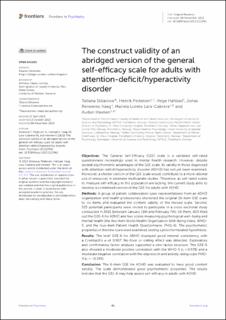| dc.contributor.author | Skliarova, Tatiana | |
| dc.contributor.author | Pedersen, Henrik | |
| dc.contributor.author | Hafstad, Hege | |
| dc.contributor.author | Vaag, Jonas Rennemo | |
| dc.contributor.author | Lara Cabrera, Mariela Loreto | |
| dc.contributor.author | Havnen, Audun | |
| dc.date.accessioned | 2024-01-16T13:37:43Z | |
| dc.date.available | 2024-01-16T13:37:43Z | |
| dc.date.created | 2023-11-30T13:49:56Z | |
| dc.date.issued | 2023 | |
| dc.identifier.citation | Frontiers in Psychiatry. 2023, 14 . | en_US |
| dc.identifier.issn | 1664-0640 | |
| dc.identifier.uri | https://hdl.handle.net/11250/3111888 | |
| dc.description.abstract | Objectives: The General Self-Efficacy (GSE) scale is a validated self-rated questionnaire increasingly used in mental health research. However, despite several psychometric advantages of the GSE scale, its validity in those diagnosed with attention-deficit/hyperactivity disorder (ADHD) has not yet been examined. Moreover, a shorter version of the GSE scale would contribute to a more rational use of resources in extensive multivariate studies. Therefore, as self-rated scales to measure self-efficacy in this population are lacking, the current study aims to develop a condensed version of the GSE for adults with ADHD.
Methods: A group of patient collaborators (user representatives) from an ADHD organization and health professionals shortened the original 10-item GSE scale to six items and evaluated the content validity of the revised scale. Second, 525 potential participants were invited to participate in a cross-sectional study conducted in 2021 (between January 19th and February 7th). Of them, 403 filled out the GSE-6 for ADHD and two scales measuring psychological well-being and mental health (the five-item World Health Organization Well-Being Index, WHO-5, and the four-item Patient Health Questionnaire, PHQ-4). The psychometric properties of the new scale were examined, testing a priori formulated hypotheses.
Results: The brief GSE-6 for ADHD displayed good internal consistency with a Cronbach’s α of 0.907. No floor or ceiling effect was detected. Exploratory and confirmatory factor analyses supported a one-factor structure. The GSE-6 also showed a moderate positive correlation with the WHO-5 (rs = 0.578) and a moderate negative correlation with the depression and anxiety rating scale PHQ-4 (rs = −0.595).
Conclusion: The 6-item GSE for ADHD was evaluated to have good content validity. The scale demonstrated good psychometric properties. The results indicate that the GSE-6 may help assess self-efficacy in adults with ADHD. | en_US |
| dc.language.iso | eng | en_US |
| dc.publisher | Frontiers Media S. A. | en_US |
| dc.rights | Navngivelse 4.0 Internasjonal | * |
| dc.rights.uri | http://creativecommons.org/licenses/by/4.0/deed.no | * |
| dc.title | The construct validity of an abridged version of the general self-efficacy scale for adults with attention-deficit/hyperactivity disorder | en_US |
| dc.title.alternative | The construct validity of an abridged version of the general self-efficacy scale for adults with attention-deficit/hyperactivity disorder | en_US |
| dc.type | Peer reviewed | en_US |
| dc.type | Journal article | en_US |
| dc.description.version | publishedVersion | en_US |
| dc.source.pagenumber | 12 | en_US |
| dc.source.volume | 14 | en_US |
| dc.source.journal | Frontiers in Psychiatry | en_US |
| dc.identifier.doi | 10.3389/fpsyt.2023.1212961 | |
| dc.identifier.cristin | 2206530 | |
| cristin.ispublished | true | |
| cristin.fulltext | original | |
| cristin.qualitycode | 1 | |

